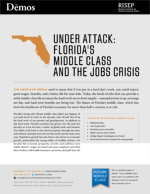The American Dream used to mean that if you put in a hard day's work, you could expect good wages, benefits, and a better life for your kids. Today, the kinds of jobs that can provide a solid middle-class life in return for hard work are in short supply-unemployment is up, earnings are flat, and hard-won benefits are being lost. The future of Florida's middle class, which has been the backbone of Florida's economy for more than half a century, is at risk.
But all of this is recently changing and Florida's middle class is in jeopardy. Florida workers have fared worse than the nation as a whole in terms of wages, benefits and employment levels. There has been a decline in the number of employers who provide their workers with health insurance which means that family illness can too easily lead to substantial costs, medical debt, and bankruptcy. And as employers replace traditional pensions with 401(k)-type plans, middle-class workers can no longer count on a secure retirement. Manufacturing jobs, which tend to offer better pay and benefits, have declined as a proportion of Florida jobs since the 1980s. Job growth has predominated in the service sector, where pay is lower, and employers are less likely to offer health and retirement benefits.
The Great Recession has exacerbated these trends, causing already-low wages to fall and hundreds of thou- sands of jobs to be lost. And not only did the state lose over 800,000 jobs from the Great Recession, but the economic effects of those lost jobs reverberated to all corners of the state, particularly the already-strained finances of the state government. We estimate that the jobs lost due to the recession have cost Tallahassee over $425 million annually in lost sales tax revenues, on top of other revenue losses from the recession, putting thousands more middle-class jobs at risk. If the state's unemployment rate were at pre-recession levels, those lost hundreds of millions would return to the state government's coffers, and could be used to help thousands of young people attend college, maintain dozens of state parks, or hire, for example, as many as 5,350 teachers or 4,650 nurses.
Florida's middle class is in even greater danger today as Governor Scott, who ran on a platform of creating 700,000 jobs, has signed a budget that will lead to job losses. Dubbed the "Pink Slip" budget by progressives, Scott has targeted healthcare and education. Most devastating, Florida has now cut its unemployment benefits, already meager at a $275 weekly maximum, the fourth lowest in the country, limiting them to 23 weeks while the unemployment rate, at a record high 11.5 percent in 2010, continues to be significantly higher than the national average. In June of 2011, Governor Scott signed a bill further limiting benefits, steadily reducing their maximum duration as unemployment falls below 10.5 percent, further squeezing unemployed workers in a state where one-third of those out of work have been jobless for over one year.
This demonstrates a fundamental misunderstanding of the economic importance of keeping workers employed as jobs are necessary for strong local economies, healthy families, and vibrant citizenries. This is, nevertheless, a time of hope as workers, unions, families, and citizens fight back against these harmful cuts. Floridians continue to demand that public servants recognize working class Americans as the heart of the economy. Since March, they have come together in more than 35 cities to rally and protest in the tens of thousands, and declared that budget cuts are not the answer to the recession-caused gap in the state's finances.
The unraveling of the social contract predated the Great Recession, but the economic crisis hastened its demise. Now is the time for employers, workers, and policymakers to come together once again to rebuild pathways to the middle class, create good jobs with fair pay and decent benefits, and ensure that prosperity is broadly shared in the next generation.

